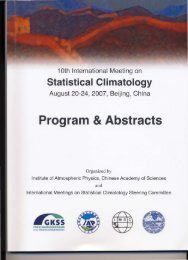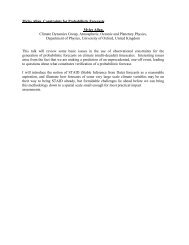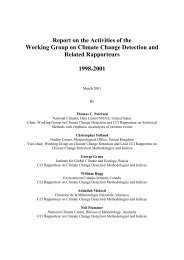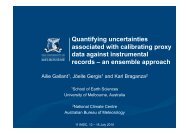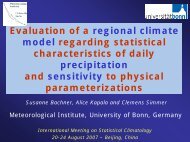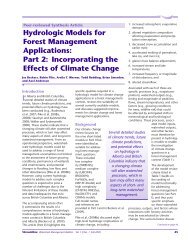The tenth IMSC, Beijing, China, 2007 - International Meetings on ...
The tenth IMSC, Beijing, China, 2007 - International Meetings on ...
The tenth IMSC, Beijing, China, 2007 - International Meetings on ...
You also want an ePaper? Increase the reach of your titles
YUMPU automatically turns print PDFs into web optimized ePapers that Google loves.
selecti<strong>on</strong> to eliminate the irrelevant features and find a subset of features that give the maximal<br />
separati<strong>on</strong> between success and failure in the operati<strong>on</strong>s. Sec<strong>on</strong>d, we apply C4.5, a decisi<strong>on</strong><br />
tree inducti<strong>on</strong> algorithm, with the selected discriminative features for building a classifier for<br />
predicting success or failure in the cloud seeding operati<strong>on</strong>s. Using the real data collected in<br />
the northeastern part of Thailand from the Royal Rain Making Regi<strong>on</strong>al Center during<br />
2004-2006, our framework yields the accurate and interpretable classifier, reaching 91.2%<br />
accuracy. In additi<strong>on</strong>, the decisi<strong>on</strong> tree can be c<strong>on</strong>verted and extracted to a rule set to improve<br />
forecast and facilitate decisi<strong>on</strong> making for c<strong>on</strong>ducting the weather modificati<strong>on</strong> activities or<br />
cloud seeding operati<strong>on</strong>s.<br />
Uncertain Climatic Land of Africa<br />
Speaker: Gord<strong>on</strong> Ondiek Nyabade<br />
Gord<strong>on</strong> Ondiek Nyabade<br />
Go Fishnet Youth Project<br />
g<strong>on</strong>yabade@yahoo.com<br />
<str<strong>on</strong>g>The</str<strong>on</strong>g> beautiful and most resourceful land of Africa is daily faced with uncertainty in her<br />
climatic c<strong>on</strong>diti<strong>on</strong>s.Each country and especially countries c<strong>on</strong>stituting East and Southern<br />
Africa regi<strong>on</strong> most people live in rural areas and depend <strong>on</strong> subsistence agriculture for their<br />
livelihoods. In the regi<strong>on</strong> land degradati<strong>on</strong> occurs mostly from soil erosi<strong>on</strong>, chemical<br />
degradati<strong>on</strong> (loss of nutrients, depleti<strong>on</strong> of organic matter and acidificati<strong>on</strong>) and biological<br />
depleti<strong>on</strong>. Other factors which c<strong>on</strong>tribute to land degradati<strong>on</strong> in the regi<strong>on</strong> include compacti<strong>on</strong><br />
from overgrazing of rangelands, unc<strong>on</strong>trolled burning and improper cultivati<strong>on</strong> of steep slopes,<br />
alternating flooding and crusting, salinizati<strong>on</strong> and polluti<strong>on</strong> which all combine to cause<br />
degenerati<strong>on</strong> of the fragile ecosystems covering large expanses of the regi<strong>on</strong>.<br />
Landscapes devoid of vegetative cover deeply incised by gullies that are difficult to<br />
reclaim, characterize large land expanses in the regi<strong>on</strong> classified as drylands. <str<strong>on</strong>g>The</str<strong>on</strong>g> porti<strong>on</strong>s<br />
classified as sub-humid or humid (highlands and wetlands) are pr<strong>on</strong>e to rapid soil loss from<br />
flash floods or periodic flooding. With a cycle of 2-3 and sometimes 5-6 years, droughts that<br />
have occurred in the regi<strong>on</strong> for over a century, worsen the land degradati<strong>on</strong> problem making<br />
land management a formidable task particularly during the critical moisture deficient periods.<br />
Differing land tenure systems combined with high poverty and low literacy levels comm<strong>on</strong><br />
am<strong>on</strong>g the rural populati<strong>on</strong> complicate land management process.<br />
Low technological capacity, poor governance, poorly c<strong>on</strong>ceived management policies and<br />
their implementati<strong>on</strong> further complicate land management issues. Technology development,<br />
technology transfer and low adopti<strong>on</strong> rates further exacerbate the situati<strong>on</strong>. Pressure <strong>on</strong> the<br />
land and competiti<strong>on</strong> for land is of main c<strong>on</strong>cern throughout the regi<strong>on</strong>. Governments in the<br />
regi<strong>on</strong> as well as private organizati<strong>on</strong>s (including the numerous NGOs operating in the regi<strong>on</strong>),<br />
some communities and individuals (including researchers and academicians) have all<br />
identified the need to c<strong>on</strong>serve land and reverse degradati<strong>on</strong> to restore its productivity and<br />
improve the quality of life for those who depend <strong>on</strong> it for their livelihoods.<br />
100



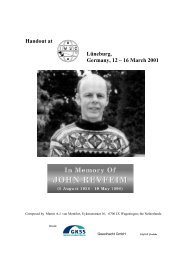
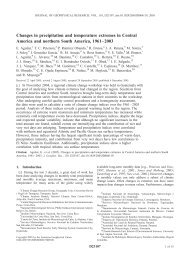
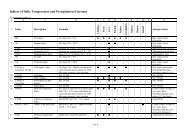
![final_program_abstracts[1]](https://img.yumpu.com/19102520/1/174x260/final-program-abstracts1.jpg?quality=85)
